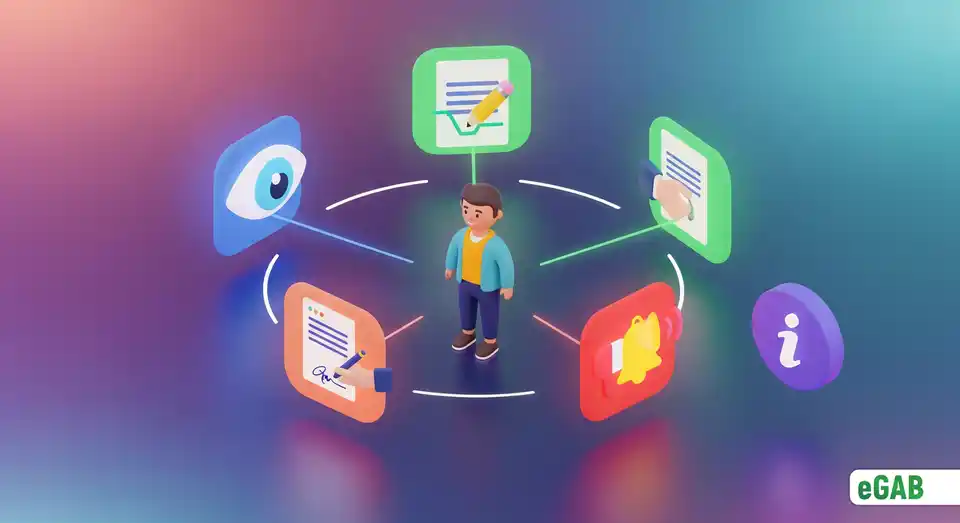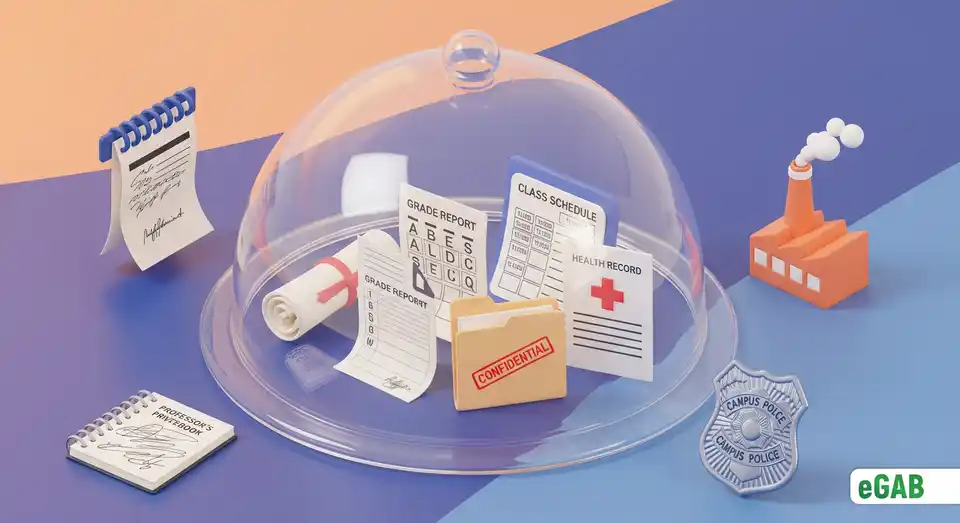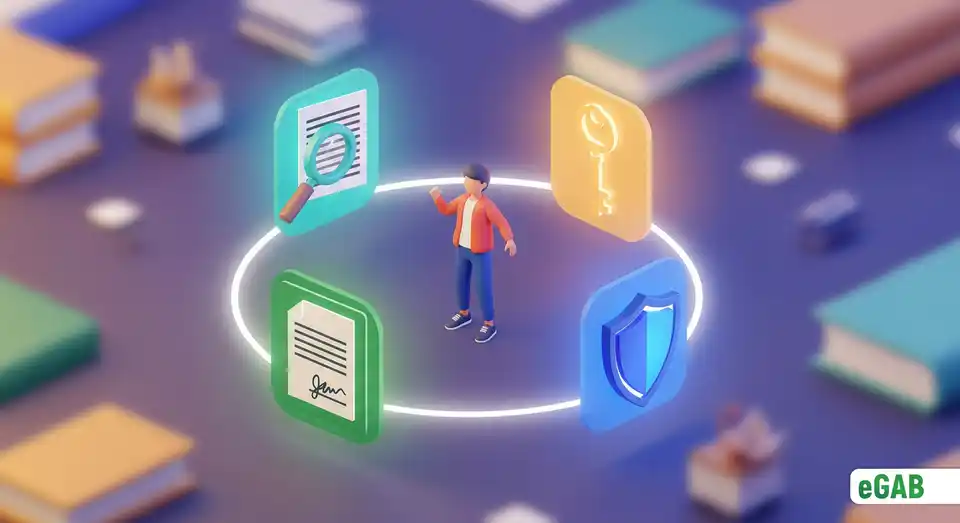What Is FERPA? A Simple Guide to Student Privacy Rights

 Author:
Artem Grigoriev
Author:
Artem Grigoriev
- What Are Your Core Rights Under FERPA?
- When Do You Gain Control Over Your Records?
- What Information Does FERPA Actually Protect?
- Can Schools Share Your Information Without Consent?
- What Are the Major Exceptions to Requiring Consent?
- What Happens if a School Violates FERPA?
- Summary: Taking Control of Your Educational Story
Have you ever wondered who has the right to see your school transcripts? Who can check your grades or pull up old disciplinary records? That’s a valid concern. Fortunately, your educational history isn’t an open book for just anyone to read.
There's a crucial federal law that serves as the main gatekeeper. It's called the Family Educational Rights and Privacy Act (FERPA) , and its entire purpose is to make sure you have control over your personal student information. In the past, this control belonged to your parents, but now it's yours. This guide will break down exactly what FERPA is, detail the specific privacy rights it gives you as a student, and show you how it empowers you to manage your own educational records.
What Are Your Core Rights Under FERPA?
FERPA isn't just some dusty old legal document. It's a living set of real, concrete student privacy rights specifically designed to empower you throughout your time in school. Getting to know these FERPA rights for students is the first and most important step toward truly taking charge of your academic privacy.
So, what are the four main rights under FERPA? While some guides might list five, they are typically grouped into four core pillars. Here are the four pillars of your rights under FERPA, often broken down into five key points for total clarity:
- The right to see what they see: You have the fundamental right to look at your own education records. This means you're empowered to inspect the records your school has on file for you. You can ask to see everything to make sure it’s all accurate and complete, which means you never have to wonder what’s in your file.
- The right to make it right: Let's say you're looking over your records and you spot something that’s just plain wrong, misleading, or even violates your privacy. In that case, you have the right to ask the school to fix it. To be clear, this doesn't mean you can change a bad grade just because you don't like it. But you can absolutely request to correct verifiable factual errors-mistakes that can be proven wrong.
- The right to give permission: This right is a big one. As a general rule, your school must get your written consent before it can share any personally identifiable information (PII) (that's data used to identify you) from your records. This strict requirement for FERPA consent is what gives you direct, personal control. And while there are a few specific exceptions to this rule, the power is firmly in your hands. It's your information to share-or not.
- The right to speak up: If you ever feel that your school isn't playing by the official FERPA rules, you have the right to file a formal complaint. That complaint goes directly to the U.S. Department of Education. This is an important process that holds schools accountable and helps ensure they take your privacy rights seriously.
- The right to be informed: Your school can't just keep you in the dark about your FERPA rights. In fact, the law requires your school to send out an annual notification to students and parents, letting them know their specific rights under FERPA.

When Do You Gain Control Over Your Records?
There’s a key moment when everything changes for you. This is the answer to the common question, when do FERPA rights transfer from parent to student? It's the exact point when control over your educational records officially passes from your parents to you. You can think of it as a coming-of-age for your data privacy.
The rights under FERPA transfer directly to you, the student, when you either turn 18 years old or enroll in a postsecondary institution (like a college or university ), whichever happens first. The moment that happens, you become what the law calls an " eligible student ," which means you now have all the rights under the eligible student FERPA rules.
Once you’re an "eligible student," you're the one holding all the cards. You’re now the one who gets to see your records, ask for corrections, and ultimately decide who views your private information. This brings up another frequent question: can a school share my grades with my parents? There is, however, one small exception to know about that lets schools share records with the parents of a financially dependent student. This specific status is defined by the tax code (meaning your parents have to claim you as a dependent on their taxes). But even with this exception, the primary control and rights rest firmly with you.

What Information Does FERPA Actually Protect?
So, what information does FERPA protect , exactly? This federal privacy law protects what are officially called " education records ." This is a very broad term that covers just about any record that's directly related to you as a student. It truly doesn't matter if that record is handwritten, stored as a digital file, or is even a video. As long as it's a record kept by your school or one of its officials, it's protected.
This wide protective umbrella covers a huge part of your academic life, including things like:
- Your grades and official transcripts
- Your class schedules and attendance history
- Any student disciplinary files
- Health and immunization records that the school keeps
- Student financial aid information
However, FERPA doesn't cover absolutely everything, which naturally leads people to ask, what is not protected by FERPA? For example, it generally doesn't protect a professor's private notes, but only if they aren't shared with anyone else. It also doesn't cover records created by campus law enforcement for a law enforcement purpose. Your employment records also aren't covered, even if you happen to work for the school; the only exception is if your job is directly tied to your student status. Finally, any records created after you've graduated and are officially an alumnus (a former student) are not covered by FERPA.

Can Schools Share Your Information Without Consent?
While FERPA is a strong shield, it isn’t an unbreakable vault. You should know about a few specific situations. In these particular cases, schools can share some of your information without getting your written consent first. They do this mainly through what's called " directory information ."
So, what is considered "directory information" under FERPA? This is basic data that generally isn't considered harmful or an invasion of your privacy if it were shared. This often includes things like your name, address, and phone number. It might also cover your date and place of birth, any honors and awards you've received, and your declared major. It can even include whether you participate in official sports or other activities.
But here’s the crucial part: your school is legally required to give you public notice of what it officially considers FERPA directory information . It must also give you a reasonable amount of time to opt-out (which means formally telling them not to share your information). This powerful FERPA opt-out means you have the power to tell your school, "No, I don't want any of my directory information shared with anyone." It’s also vital for you to know that a school can never list your Social Security number or your student ID number as directory information. Want to dive deeper into these details? The FERPA General Guidance for Students is an excellent official resource.

What Are the Major Exceptions to Requiring Consent?
Beyond directory information, FERPA also includes a few common-sense exceptions. These are very specific situations where your school can share your records without asking for your permission first. These FERPA exceptions are designed to help the school run smoothly and safely for everyone.
Some of the most important exceptions include:
- Sharing information with " school officials " (like your professors or campus administrators) who have a " legitimate educational interest " (meaning they need to see the records to do their jobs). Your school must clearly define these terms in its annual FERPA notice. But what it really boils down to is this: your academic advisor can access your records to help you succeed, but they can't just check them out of curiosity.
- Sending your records to another school you’re planning to transfer to or are enrolling in.
- Complying with a judicial order or a legally issued subpoena (a formal, legal demand for records from a court).
- In a health or safety emergency , schools can share necessary information with the right people, such as paramedics, the police, or your parents. This directly answers the common question, can schools share information in an emergency? Yes. The main goal here is to protect you or others from a clear and significant threat.
- Providing information to federal and state authorities who are auditing education programs. They can also share it with accrediting organizations (groups that ensure your school meets certain quality standards).

What Happens if a School Violates FERPA?
So, what if you believe a school has shared your information improperly or has trampled on your privacy rights? You have a clear path for recourse (a way to get help). If you think a FERPA violation has happened, you'll want to know: how do I file a FERPA complaint? You can file a complaint with the U.S. Department of Education’s Student Privacy Policy Office (SPPO) . This is the official government office tasked with investigating and resolving these exact issues.
It's crucial to understand that you can't personally sue a school in court, so that’s the final answer to the question, can you sue a school for a FERPA violation? Instead, the Department of Education handles enforcement administratively (meaning it's managed by a government agency, not the courts). The biggest penalty a school can face for a violation is severe: if they repeatedly fail to comply with FERPA, they risk losing all of their federal funding. That's a powerful consequence that gives schools a very strong reason to protect your privacy.
Quick Insight: Worried about your "directory information" being made public? At the start of every school year, look for a FERPA notice from your school. This document tells you exactly what they consider "directory" info. It also shows you the simple steps you need to take to opt-out and keep that information private. It’s an easy way to take control of your personal data.

Summary: Taking Control of Your Educational Story
Ultimately, the Family Educational Rights and Privacy Act (FERPA) is much more than just a legal acronym. It's a powerful toolkit that puts you in charge of your academic narrative. This vital federal law establishes your core student privacy rights , ensuring your educational journey-from grades and transcripts to disciplinary files -remains your own.
The heart of FERPA is built on four key pillars. You have the right to look over your records to make sure they're accurate. You also have the right to ask for corrections to any errors you find. What's more, you must give written consent before the school shares your personally identifiable information (PII) . Finally, you have the right to file a complaint if you feel your school has failed to comply.
A pivotal moment comes when you become an " eligible student ," which happens when you turn 18 or enroll in a college or university. At that point, all these rights transfer directly to you, giving you the final say over your records.
Now, the law does allow for common-sense FERPA exceptions , like in health emergencies. It also permits sharing with "school officials" who have a "legitimate educational interest." But here's the key: the default setting is always privacy first. Even with basic " directory information ," like your name and major, schools must give you a choice. You have the opportunity to opt-out and keep it completely private.
And if a FERPA violation ever happens? You have a clear path for recourse. You can file a complaint with the U.S. Department of Education. This is a critical process that holds schools accountable and ensures they take your privacy seriously.

